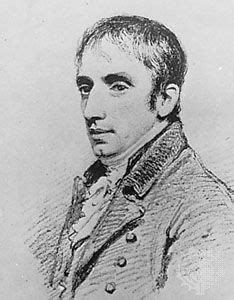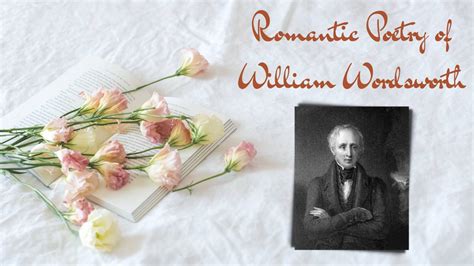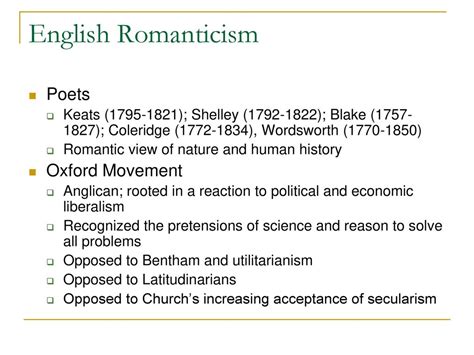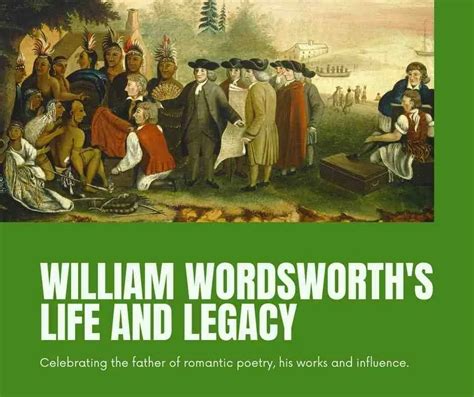In the world of literature, few names hold as much significance as William Wordsworth. His impact on the Romantic movement and his timeless poems have solidified his place as one of the greatest English poets of all time. Explore his biography, delve into his works, and uncover the profound influence he left on the literary landscape.
Biography: William Wordsworth was born in 1770 in Cockermouth, Cumberland, England. His early experiences in nature and the Lake District would shape his poetic style and themes for years to come. As a key figure in the Romantic movement, Wordsworth's love for the natural world and emphasis on emotion and imagination set him apart from his contemporaries.
Works: Wordsworth's most famous works include "I Wandered Lonely as a Cloud," "Lines Composed a Few Miles Above Tintern Abbey," and "The Prelude." His poetry explores themes of nature, memory, and the power of the human mind. Through his words, readers are transported to a world of beauty and introspection.
Influence: Wordsworth's influence extends far beyond his own lifetime. His poetry inspired generations of writers and poets, including the likes of Samuel Taylor Coleridge and John Keats. His emphasis on the beauty and power of nature continues to resonate with readers today, making his work as relevant now as it was during his lifetime.
Early Life and Education of William Wordsworth

William Wordsworth's early life and education played a significant role in shaping his poetic career and philosophical outlook. From his childhood in the Lake District to his time at Cambridge University, each experience left a lasting impact on his writing and worldview.
| Birthdate: | April 7, 1770 |
| Birthplace: | Cockermouth, Cumberland, England |
| Education: | Attended Hawkshead Grammar School and St. John's College, Cambridge |
Key Themes in the Poetry of Wordsworth
In his poetry, William Wordsworth explores a range of key themes that are central to his work. These themes reflect his deep connection to nature, his concern with the human experience, and his exploration of the role of memory and imagination in shaping our perceptions of the world. By examining these key themes, we can gain a deeper understanding of Wordsworth's poetry and the enduring impact of his work on literature and culture.
- Nature: Wordsworth's poetry is often characterized by a profound love and appreciation for the natural world. He believed that nature had the power to inspire, console, and elevate the human spirit, and many of his poems explore the beauty and majesty of the natural world.
- Human experience: Wordsworth's poetry also delves into the complexities of the human experience, including themes of loss, grief, love, and self-discovery. Through his exploration of these themes, Wordsworth sought to capture the universal aspects of human emotion and experience.
- Memory and imagination: Wordsworth believed that memory and imagination were essential tools for understanding and interpreting the world around us. In his poetry, he often reflects on the ways in which memory and imagination shape our perceptions of reality and contribute to our sense of self.
William Wordsworth's Influence on Romanticism

William Wordsworth, a prominent figure in the Romantic literary movement, had a significant impact on shaping the ideals and themes of Romanticism. His poetry centered around nature, emotions, and the inner self, which reflected the core principles of the Romantic era. Wordsworth's unique style and perspective inspired countless other poets and writers to explore similar themes in their own work, making him a central figure in the development of Romanticism.
Major Works of William Wordsworth
In this section, we will explore some of the most significant works by William Wordsworth that have left a lasting impact on literature and poetry.
| Title | Publication Year |
|---|---|
| Lyrical Ballads | 1798 |
| The Prelude | 1850 |
| Tintern Abbey | 1798 |
| Ode: Intimations of Immortality | 1807 |
Wordsworth's Political Views and Activism

William Wordsworth's poetry was not just about nature and beauty; it also reflected his deep political views and activism. Through his writing, Wordsworth critiqued the social and political injustices of his time and advocated for reform and change.
Wordsworth's Relationship with Samuel Taylor Coleridge
William Wordsworth and Samuel Taylor Coleridge were two literary giants of the Romantic era who shared a close friendship and collaborative bond that greatly influenced each other's work.
- Wordsworth and Coleridge first met in 1795 and quickly formed a deep connection based on their shared love for nature and poetry.
- The two poets collaborated on the famous collection "Lyrical Ballads," which is considered a landmark in English literature and marked the beginning of the Romantic movement.
- Coleridge's imaginative and philosophical style complemented Wordsworth's focus on natural beauty and everyday experiences, creating a unique fusion of literary voices.
- Their friendship endured through many personal and professional challenges, and they continued to support and inspire each other throughout their careers.
Legacy of William Wordsworth in Literature

William Wordsworth's influence on literature can be seen in various aspects of his work. His groundbreaking poetry, focus on nature, and exploration of the human experience have had a lasting impact on the development of English literature.
Wordsworth's unique writing style and themes have inspired generations of poets and writers to delve into the beauty of the natural world, explore the complexities of human emotions, and reflect on the importance of individual experience in literature.
Modern Interpretations of Wordsworth's Poetry
In this section, we will explore how contemporary scholars and poets have reimagined and reinterpreted the works of William Wordsworth. Through innovative analyses and creative responses, these writers have brought new insights and perspectives to Wordsworth's poetry, shedding light on its enduring relevance and power.
| Author/Interpreter | Approach | Impact |
|---|---|---|
| Seamus Heaney | Focuses on the themes of nature and memory, drawing parallels between Wordsworth's landscapes and his own experiences in Ireland. | Helped to introduce Wordsworth to a new generation of readers and inspired a renewed interest in Romantic poetry. |
| Jackie Kay | Explores issues of identity and belonging in relation to Wordsworth's reflections on childhood and loss. | Offers a contemporary perspective on Wordsworth's timeless themes, connecting them to modern social and cultural concerns. |
| John Keats | Examines Wordsworth's use of language and form, reimagining his verse through a postmodern lens. | Challenges traditional interpretations of Wordsworth's poetry and highlights its versatility and adaptability. |
FAQ
Who was William Wordsworth?
William Wordsworth was a famous English Romantic poet who played a key role in the Romantic literary movement in the late 18th and early 19th centuries. He is best known for his poems that celebrate the beauty of nature and the simplicity of everyday life.
What are some of William Wordsworth's most famous works?
Some of William Wordsworth's most famous works include "I Wandered Lonely as a Cloud" (also known as "Daffodils"), "Lines Composed a Few Miles Above Tintern Abbey," and "The Prelude." These poems are celebrated for their beautiful descriptions of nature and deep emotional resonance.
How did William Wordsworth's works influence future generations of writers?
William Wordsworth's emphasis on the beauty of nature, the importance of individual experience, and the power of the imagination had a profound influence on future generations of writers. His ideas helped shape the Romantic literary movement and continue to inspire poets and writers to this day.
What are some key events in William Wordsworth's biography?
William Wordsworth was born in 1770 in England and went on to become one of the most influential poets of his time. He was close friends with other Romantic poets such as Samuel Taylor Coleridge and Percy Bysshe Shelley. Wordsworth's poetry collection "Lyrical Ballads," co-authored with Coleridge, is considered a seminal work in the Romantic literary movement.



